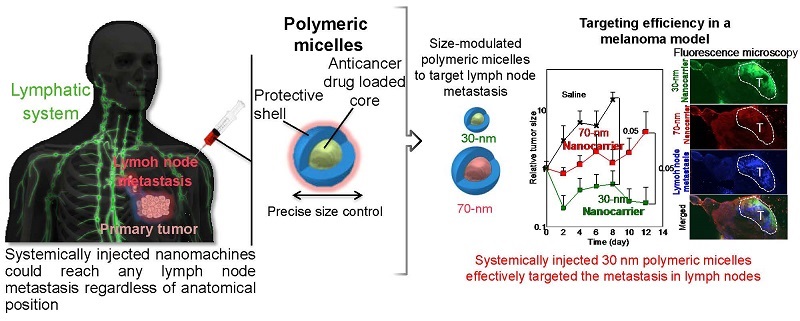Polymeric micelles for targeting lymph node metastasis Nanocarrier size related to effectiveness


Lymph node metastasis could be targeted by intravenously injecting polymeric micelles as drugs nanocarriers (left) for enhanced antitumor efficacy. The size of these nanocarriers was found to be important for the effective targeting of the metastatic foci in lymph nodes. Accordingly, polymeric micelles having 30-nanometer diameter effectively suppressed the growth of metastasis, whereas 70-nanometer micelles were less effective (right). Fluorescence microscopy of metastatic lymph nodes showed the superior accumulation of 30-nanometer micelles (right; green) in the metastasis.
© 2015 Kataoka Laboratory
A University of Tokyo research group has revealed that systemic injection of polymer micelles with a diameter of less than 50 nanometers encapsulating anticancer drugs is effective against cancer that had spread to the lymph nodes in mice.
The lymph nodes remove bacteria and foreign matter circulating within the body. Cancer that has spread (metastasized) to the lymph nodes is one type of malignant tumor that is extremely difficult to treat with existing therapies. So far, no efficient drug delivery system (DDS) has been found for delivering effective drugs against cancer that has metastasized to the lymph nodes.
The research group of Professor Kataoka Kazunori at the Graduate School of Engineering compared the effect of a platinum anticancer drug encapsulated in nanocarriers of a range of sizes against cancer that had metastasized to the lymph nodes. The group used polymeric micelles with diameters of 30 and 70 nanometers and the clinically-used 80-nanometer diameter DDS Doxil ® (doxorubicin-loaded liposomes). The research group found that only the 30-nanometer nanocarriers were passed through tumor blood vessels and able to penetrate throughout the tumor in significant quantities.
Professor Kataoka says, “This is the first study to show that control of particle size is an important factor in designing nanocarriers for treating cancer that has metastatized to the lymph nodes. Moreover, these results open the way to development of DDS for systemic treatment of metastatized cancers of the lymph nodes. These findings will be useful for development of non-surgical therapies for metastatized cancers of the lymph nodes in cases that do not present clinical symptoms.”
Paper
, "ystemic Targeting of Lymph Node Metastasis through the Blood Vascular System by Using Size-Controlled Nanocarriers", ACS Nano Online Edition: 2015/04/16 (Japan time), doi: 10.1021/nn5070259.
Article link (Publication)
Links
Graduate School of Engineering
Graduate School of Engineering, Department of Bioengineering
Kataoka Laboratory, Department of Materials Engineering, Graduate School of Engineering






